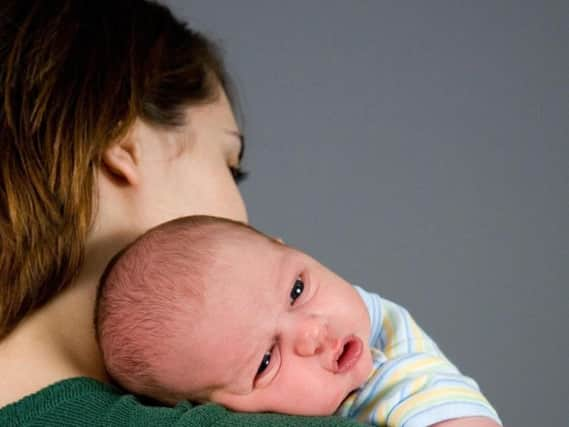'A momentary loss of self-control cost my son his life'


That is the blunt but understanding message behind a new campaign being launched in Lancashire this week to reduce infant head injuries.
The ICON campaign developed following concerns across the country about what is now called abusive head trauma and used to be called shaken baby syndrome.
Advertisement
Hide AdAdvertisement
Hide AdOn Tuesday, a bereaved mother will visit Lancashire to talk about her experience of losing a child as a result of such injuries.
Her son had been left with her then partner who shook him, causing life changing and life limiting injuries, leading to his death at the age of 14.
Local experts hope her message will bring home the suffering caused by a moment’s loss of self control and how important it is to spread knowledge about coping techniques and the help available.
Jane Booth, chairman of the Lancashire Safeguarding Children and Lancashire Safeguarding Adult boards, said: “There will be new materials and campaigning to support parents looking after babies that cry as babies do. Nationally over the last four to five years there’s been growing concern about the number of children injured through abusive head trauma.”
Advertisement
Hide AdAdvertisement
Hide AdDevelopments in medicine mean such cases can be better detected said Jane, who added: “Here in Lancashire we have had eight incidents we’ve reviewed since 2016.
Of the eight, four are deceased and four survived injuries but with serious consequences for them - brain damage of varying degrees of severity.”
The campaign will be run in conjunction with both Blackpool and with Blackburn with Darwen Safeguarding Boards under the Lancashire Safeguarding umbrella. Cheshire, Rochdale, Manchester, Hampshire and Gloucestershire councils are also promoting the ICON campaign.
ICON initiated in North Manchester and Rochdale and Jane said: “It kicked off in Rochdale at which point we said to ourselves are other people finding the same thing? It became clear it was an issue.”
Advertisement
Hide AdAdvertisement
Hide AdShe added: “This campaign is about saying babies do cry. The crying is designed to drive you crazy and it does from time to time but actually you can cope.”
Crying she stresses is normal - especially from two weeks of age to eight weeks before generally settling own: “It’s just developmental. They are hungrier, more demanding ... and just able to express themselves better.“
Soothing a baby involves checking if an infant is hungry and thirsty, needs a cuddle, needs a nappy change or a sleep.
But and there is the big but, sometimes none of those checks or care settle an infant and sometimes such crying goes on well beyond eight weeks.
Advertisement
Hide AdAdvertisement
Hide AdJane stresses they want to offer reassurance: “If it’s really getting to you, if the baby is safely in a cot or pram, just walk away.
“Nothing is going to happen if a baby cries a bit. If you walk away for a bit and collect yourself and then go back and check on the baby then you feel a bit calmer.
“The last bit of the message is never, ever shake a baby.
“That’s a very, very simple message. We’re trying to get the message out as widely as possible
“The dreadful thing is it doesn’t have to be a violent assault. One shake is enough to cause injury. Babies’ brains are delicate things.”
Advertisement
Hide AdAdvertisement
Hide AdLeaflets and posters have been created carrying the ICON message: “Babies Cry, You Can Cope!”
Rachel Rimmer, the pan Lancashire CDOP (Child Death Overview Panel) coordinator, pictured inset, said: “They are going to be in libraries and children’s centres. We’re targeting GPs as part of phase two later in the year.”
The advice being issued also stresses if you feel you need support speak to someone - family, friends, midwife, health visitor or GP.
The campaign gets its name from four statements:
1) Infant crying is normal and it will stop!
2) Comfort methods can sometimes soothe the baby and the crying will stop.
Advertisement
Hide AdAdvertisement
Hide Ad3) It’s Ok tot walk away if you have checked the baby is safe and the crying is getting to you.
4) Never, ever shake or hurt a baby.
Jane said services are much more targeted to needs now but losing your cool with a baby happens in an instant, and can happen without warning signs.
In such instances she emphasises home conditions might not provide the clue that extra support is needed or someone is under extreme stress with a baby crying.
Also it is not necessarily the main carers who snap, it can be a baby sitter a partner or another relative
Advertisement
Hide AdAdvertisement
Hide AdJane said: “Even the best of us can snap- you see families facing this where you have not had any reason to believe (they are) at risk.”
She stressed pre-education before the baby arrives is key - along with being told how to physically care for a new infant acknowledgement must be given to the stresses and pressures which can await those caring for a new baby.
She continued: “It’s one of those things that’s over in a moment I actually want parents to be prepared for the fact parenting is a challenge.”
Rachel added: “ If a baby is crying a lot it’s working through a crying plan where you never get to that stage.
“It’s like asking a neighbour for support. It’s having a plan in place, thinking in advance.”